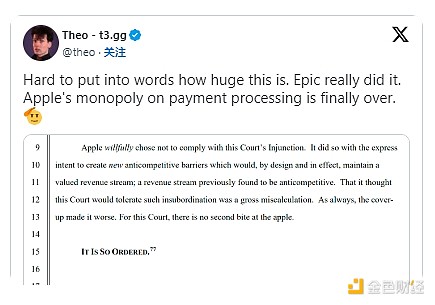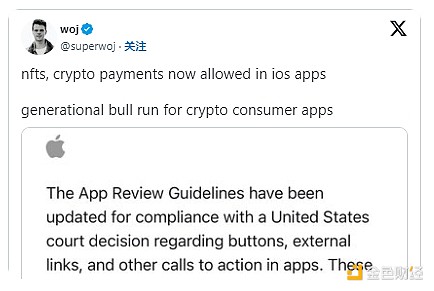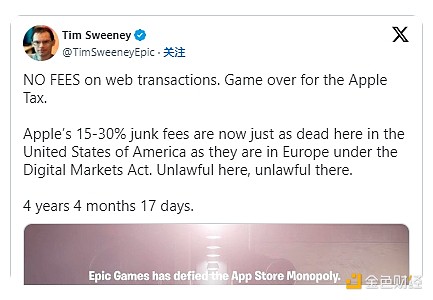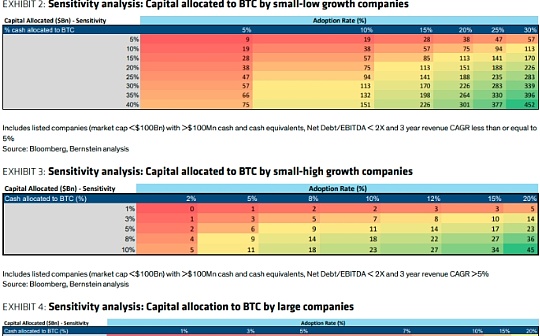Bankless: How will the App Store ruling open the on-chain app door?

転載元: jinse
05/07/2025·4DSource: Bankless; Translated by: Tao Zhu, Golden Finance
What happens when the world's largest tech monopoly is sued by one of the most powerful studios in the gaming world and ultimately loses? The answer is likely to change mobile development forever...
After nearly five years of legal battle, Epic Games forced Apple to rewrite the rules of the App Store. This not only brings huge opportunities for cryptocurrencies, but also brings a turning point for developers who have been tethered by Apple's walled gardens: they are finally free to make a profit as they wish.
Today, we will dig into Epic's legal battle that has lasted for many years and explore its far-reaching impact on mobile app developers.
Apple's antitrust liquidation
In August 2020, Epic Games sued Apple, accusing the tech giant of anti- competitive behavior after the App Store removed Epic's popular multiplayer battle royale game "Fortnite".
The core of the controversy lies in Apple's policy that mandates all in-app purchases to be made through the App Store and charges up to 30% of the payment fee; Epic Games has tried to circumvent this predatory policy by launching its own in-game payment system.
Although Apple eventually made a slight concession to allow developers to link to other payment options, the updated policy still requires a 27% share with Apple Pay and strictly limits how payments are displayed in the app.
Neither side was willing to give in, but after nearly five years of protracted lawsuits, the US District Court of Northern California finally made a final ruling on the case.
In a harsh condemnation of eighty-page wording, Judge Yvonne Gonzalez Rogers ruled that Apple deliberately violated the law, setting up anti-competitive barriers designed to protect its multi-billion-dollar app store revenue stream.
In addition, she also referred Apple and one of the vice presidents of finance to federal prosecutors, accusing them of contempt of court on the grounds that they violated a 2021 ban on anti-competitive pricing practices in app stores.
The 2021 ban on Apple mainly challenges its arbitrary 30% commission, while the latest ruling explicitly prohibits Apple from charging commissions for off-app purchases and controls how developers and users communicate.

The Golden Age of Cryptocurrencies?
In order to comply with Judge Gonzalez Rogers' ruling, Apple was forced to update its App Store review guidelines for the United States.
The revised guide not only lifts any ban on external links, but also explicitly allows developers to display NFT collections to users. This marks a major victory for the emerging gaming industry in the cryptocurrency space, troubled on-chain artists and others who make profits with blockchain collectibles.
Most importantly, however, the updated guide exempts U.S. apps from Apple's ban on external payment methods outside the App Store that can bypass its 30% revenue share.

Cryptocurrency payments are highly praised for their nearly instant speed and extremely low cost. Previously, mobile app developers could only use approved high-cost payment channels, and Apple's recent defeat cleared the way for developers to use any payment method they want!
In an era when mobile applications can choose how users pay, many cost- conscious developers will rationally abandon Apple's "walled garden" and high fees and choose other solutions.
By default, App Store payment provides undeniable convenience for end users: they have registered payment information with Apple, so they may be reluctant to store sensitive financial information on random third-party platforms.
While large studios like Epic Games may find it worthwhile to develop proprietary payment portals independently, for smaller studios, this new unlimited environment provides fertile soil for stablecoin experiments.
Rather than repeatedly loading credit card information on a random website and praying that they are capable of protecting it, app users can use any tokens in their crypto wallet to make instant payments, simplifying the payment process and ensuring that all participants have a trustless experience.
In turn, developers can instantly access their entire funds (possibly stored in stablecoins) and outsource payment responsibilities to on-chain economies built specifically for this purpose, thus focusing on game development.
This is a truly compelling proposal for all parties, promoting user-app interaction, enhancing the economic benefits of mobile app development, and encouraging crypto payments to become mainstream.
Apple's policy changes are yet to be settled, but the door to mobile monetization is clearly open. In this new era, developers can build, profit and scale as they wish.
With the advent of seamless crypto payments, the future prospects for on-chain applications have never been more bright.



 panewslab
panewslab

 chaincatcher
chaincatcher